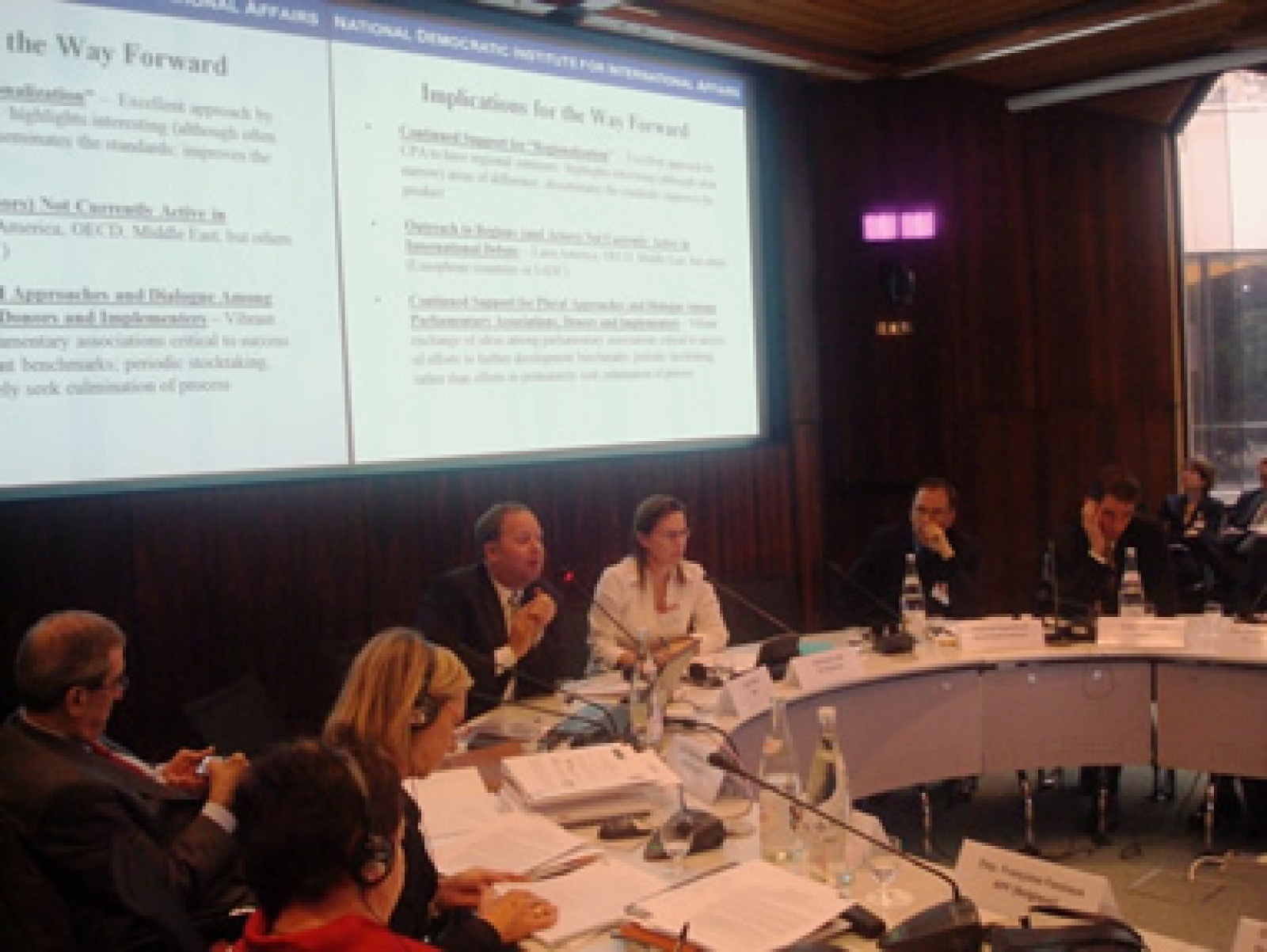
SHARE
ISSUES
At a unique gathering in Paris last week, key international parliamentary associations gathered to assess progress on reaching consensus on minimum benchmarks for democratic parliaments – one of the key pillars of representative democracy. While there is broad international agreement, for example, on minimum characteristics of democratic elections, international benchmarks on other democratic processes and institutions are still emerging.
The conference drew on pioneering work in this area by the Inter-Parliamentary Union (IPU), the Commonwealth Parliamentary Association (CPA) and the Assemblée Parlementaire de la Francophonie (APF) to develop benchmarks and self-assessment frameworks for democratic parliaments. The conference was organized by the United Nations Development Programme (UNDP) and the World Bank Institute (WBI), and was opened by Assistant Secretary General Olav Kjørven, who serves as director of UNDP’s Bureau for Development Policy. NDI’s discussion document on international norms and standards for democratic parliaments, published in 2007, has helped to inform efforts by parliamentary organizations in setting benchmarks. It is one of a number of documents cited in a UNDP background paper for the conference, which discusses progress in this field.
The conference included representatives from a broad range of parliaments and parliamentary associations. Secretary General William Shija of the CPA discussed the work of the 2006 CPA Study Group on benchmarks, as well as subsequent CPA efforts to foster regional dialogue on the benchmarks standards. The APF made a presentation on related efforts within the Francophone world.
Speaker Taomati Iuta of the Parliament of Kiribati discussed Recommended Benchmarks for Pacific Island Democratic Legislatures, one of several CPA efforts at regionalization, which tailors the benchmarks for the needs of smaller legislatures and regional circumstances. Deputy Speaker Dame Jennifer Smith of the Bermuda House of Assembly presented the results of an internal review of Bermuda’s parliament against the CPA benchmarks. The manager of the Strategic Planning Office of the Canadian Senate reported on a similar self-assessment that the Canadian parliament had conducted against the CPA benchmarks. Deputy Speaker Faisal Karim Kundi of the National Assembly of Pakistan presented on an assessment of the Pakistan National Assembly conducted by PILDAT, the Pakistan Institute of Legislative Development and Transparency.
NDI’s Director of Governance K. Scott Hubli presented observations regarding common themes among the various benchmarks and self-assessment frameworks, as well as areas where there is less consensus. These observations were subsequently incorporated into the participant’s statement. Robert Benjamin, NDI’s regional director for Central and Eastern Europe programs, presented results of survey research that NDI conducted in partnership with the WBI in four countries – Colombia, Guatemala, Peru and Serbia. The research examined gaps between formal powers and actual practice in a number of areas covered by international benchmarks.
Finally, the role of civil society with respect to parliamentary benchmarks was discussed by Andrew Mandelbaum, a joint NDI and WBI consultant, who presented preliminary results from a global survey of parliamentary monitoring organizations.
While elections provide the basis for rule by the people, they do not guarantee that citizens are effectively represented after the elections. The benchmarks discussed at the conference are an initial step to build minimum norms for democratic parliaments to ensure that they effectively perform their legislative, oversight and representative functions. Legislatures that fail to meet basic minimum benchmarks run the risk of fuelling public cynicism against political elites, which can ultimately erode popular support for the democratic system itself.
The first day of the conference coincided with the initial launch of Agora, a website designed to encourage collaboration around the world on parliamentary standards and host key documents. The website, which continues to evolve, is currently available in English and French and contains a library of resources that registered users can access, as well as a range of other tools related to parliamentary development. NDI joins the United Nations Development Programme, the WBI and the International Institute for Democracy and Electoral Assistance as members of the Agora’s implementing board.
Pictured Above: NDI’s Director of Governance K. Scott Hubli presents observations regarding common themes among the various benchmarks and self-assessment frameworks.
Published on March 9, 2010


